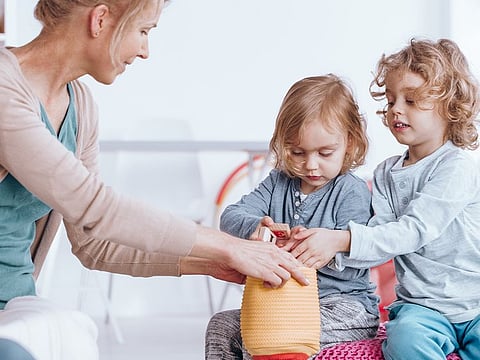"What age should my child develop empathy for others?"
We speak to Dr Hibah Shata for tips on how to help your child flex their kindness muscles

As parents we’re always secretly watching out for any sign that our children might be ahead of the curve or harbouring the potential to be a future genius. On the flipside, we’re also quick to worry if they don’t seem to be meeting the usual milestones on time, or that their inability to share might mean they find it hard to make friends as they grow up. Dr Hiba Shata, director of the Child Early Intervention Medical Center and the Maharat Learning Center, is an expert in child development. Here she shares her wisdom on how the ability to be kind and empathetic develops in all children – whether they have special needs or not.
If my child is not kind to other children does it mean they are bad?
“Kindness is one of the fundamental human emotions. Failure of a child to show kindness to other children does not mean they are bad. It is an executive functioning skill, which requires time to develop fully. For many children – with or without special needs – this is very difficult as it requires a combination of many skills, including thinking, putting words together, social interaction and keeping a conversation going.”
What age do children develop the ability to have empathy for others?
“Science suggests that, typically, children are able to show empathy towards others at the age of two. Children with special needs are no different to typical children when it comes to feeling and noticing the happiness, the pain or the anger of others; however if they lack language skills, or do not know how to express their emotions, or had not learnt how to hug when happy, they may not be able to express their empathy and may show more aggression, or a tantrum, to express their emotions.”
Do we expect too much of our children in terms of expecting them to be kind?
“It is undeniable that every normal, loving parent wishes their child to be kind to others and to make successful relationships with friends. Hence, some parents might try to exaggerate that urge and encourage extra kindness trait to be grown in their children, while other parents might not put as much emphasis on the issue.”
Are there ever times or situations when we should not expect our child to be kind?
“If we do not encourage children to show kindness and help them to understand the impact of their words and actions on others – and bolster that with positive reinforcement and rewards – we should not expect them to be kind in all situations. The more we encourage them, the more natural it becomes.
“For special children, they may need more support when it comes to social and communication skills as it may not come naturally without help. My daughter is autistic and when her grandma passed away, she kept on mentioning her and asking about her and constantly expressing her sadness. I did not expect that because the concept of death is not easy to teach to a special child.”
What is the best way to react when my child is not kind?
“If your child doesn’t wish to interact with other children because they prefer to be alone, or play alone, and has no interest in participation in these social acts, you should not force them to do so. Instead seek expert advice as your child may need to be taught these skills with plenty of role modelling and reinforcement.”
Do children with special needs require more support in this area?
“Not all children with special needs have challenges in this area, however children with developmental delays and Autism Spectrum Disorders will benefit from Applied Behavioural Analysis programs, which will teach the theory of mind, social skills, communication skills and executive functioning skills. These programs will give the child the skills to understand many concepts and help them to develop social relationships and functional adaptive life skills.”
Read more:



